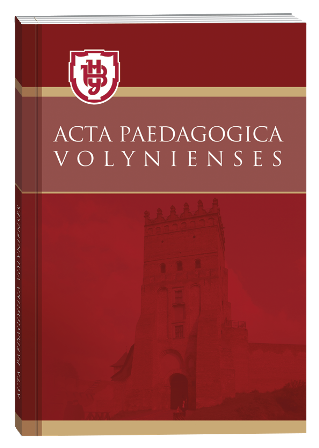CROSS-CULTURAL COMPETENCE OF A STUDENT OF HIGHER EDUCATIONAL ESTABLISHMENT SPECIALTY “JOURNALISM”: PRACTICAL ASPECT
DOI:
https://doi.org/10.32782/apv/2023.3.11Keywords:
competence, cross-cultural competence, a student of higher educational establishment specialtyAbstract
The article clarifies the meaning of the concepts of «competence», «cross-cultural competence», and analyzes the main components of cross-cultural competence of students of higher educational establishment specialty «Journalism». A review of the works of Ukrainian scientists on the study of cross-cultural competence has been carried out. The concept of «competence» presented in lexicographic sources is considered. Researchers consider the concept of competence as «ability to self-improvement», «characteristic of personality», «availability of knowledge», «availability of a certain qualification», «availability of minimum experience», etc. Competence in work is defined as a quality of a person, his certain property, which is based on knowledge, experience, moral principles and manifests itself at a critical moment with the help of the ability to find a connection between the situation and knowledge in making adequate solutions to the outlined problem. It is emphasized that a specialist acquires competence not only during training, but also with the help of nonformal education, as a result of the influence of the environment. This is an acquired personality characteristic that contributes to successful entry into the life of modern society; an integrated result, which involves a shift of emphasis from the accumulation of normatively defined knowledge, abilities, skills to the formation and development of the ability to act practically, to apply the experience of successful activity in a certain field. Within the cross-cultural approach, three levels of competence are distinguished: communicative, linguistic and intercultural. It is noted that cross-cultural competence contains linguistic, cultural and psychological components, which are presented in such types of competence as speech, linguistic, social, socio-cultural, subject, discursive. Speech, combined, situational exercises and tasks aimed at mastering pragmatic and linguistic competence are important for the formation of cross-cultural competence of higher education students. During their studies, students of higher education must have language knowledge, skills in using language clichés in accordance with communicative situations, be able to interpret the behavior of the interlocutor, have appropriate ideas about the history and culture of the people, etc. It is also worth considering both the language component of cross-cultural competence and the ability to use acquired knowledge in various communicative situations, the ability to understand the behavior and peculiarities of the foreigner's thinking. We see the perspective of further research in the study of the linguistic socialization of the individual and the identification of the levels of formation of cross-cultural competence of the students of higher education.
References
Баніт Ольга. Кроскультурна компетентність сучасного топ-менеджера міжнародної компанії. Edukacja Zawodowa i Ustawiczna. № 4. 2019. P. 171−183.
Бібік Н. М., Вашуленко М. С., Мартиненко В. О. Формування предметних компетентностей в учнів початкової школи : монографія. Київ : Педагогічна думка, 2014. 346 с.
Вітюк В. Наукові основи формування правописної компетентності майбутніх учителів Нової української школи : монографія. Київ : Інтерсервіс, 2020. 424 с.
Великий тлумачний словник сучасної української мови (з дод. і доп.) / уклад. і голов. ред. В. Т. Бусел. Київ; Ірпінь : ВТФ «Перун», 2005. 1728 с.
Головань М. С. Компетенція і компетентність: досвід теорії, теорія досвіду. Вища освіта України. 2008. № 3. С. 23 – 30.
Голуб Н. Б. Компетентнісно спрямоване навчання української мови : концептуальний підхід. Теоретична і дидактична філологія : збірник наукових праць. Випуск 12. Переяслав-Хмельницький, 2012. С. 26–22.
Енциклопедія освіти / [Акад. пед. наук України; відповід. ред. В. Г. Кремень]. Київ: Юрінком Інтер, 2008. 1040 с.
Ничкало Н. Г., Зязюн І. А., Гончаренко С. У. та ін. Професійна освіта: Словник. Навч. посіб. 2-е вид.; за ред. Н. Г. Ничкало. Київ: Вища школа, 2000. 380 с.
Пальчикова О. О. Крос-культурна компетентність у навчанні української мови як іноземної. Філологічні студії: Науковий вісник Криворізького державного педагогічного університету. 2012. № 8. С. 319–326.
Побірченко Н. А. Наука і практика компетентнісного виміру особистісного зростання учнівської молоді. URL: http://elibrary.kubg.edu.ua/id/eprint/2855 (дата звернення: 21.03.2023).
Про затвердження Національної рамки кваліфікацій : Постанова КМУ від 23.11.2011 р. № 1341. URL: http:// zakon4.rada.gov.ua/laws/show/1341-2011-п. (дата звернення 03.04.2023).
Про освіту : Закон України. URL: https://zakon.rada.gov.ua/go/2145-19. pdf. (дата звернення: 31.03.2023).
Словник-довідник з української лінгводидактики : навч. посіб. / кол. авторів за ред. М. І. Пентилюк Київ : Ленвіт, 2015. 320 с.
Словник іншомовних слів / Уклад. Л. О. Пустовіт та ін. Київ : Довіра, 2000. 1018 с.
Словник української мови: в 11 томах. URL: http://sum.in.ua/ (дата звернення: 24.03.2023).
Сукаленко Т. М. Формування комунікативної компетентності здобувачів вищої освіти спеціальності «Журналістика». Управління публічними фінансами та проблеми забезпечення національної економічної безпек. [Електронне видання]: збірник тез Міжнародного податкового конгресу (м. Ірпінь, 3 грудня 2020 р.). Ірпінь: Університет ДФС України, 2020. С. 830‒833.
Сукаленко Т. М., Позднякова О. О. Компетентність і компетенція як ключові поняття компетентнісного підходу. Наукові праці Кам’янець-Подільського національного університету імені Івана Огієнка: Філологічні науки. Кам’янець-Подільський, 2018. Вип.46. С. 164‒168.
Шиян Т. В. Кроскультурна комунікація в практиці викладання англійської мови. Культурний інтелект: монографія / за наук. ред. А. К. Солодкої. Миколаїв: ФОП Швець В.М., 2016. С. 189−204.







